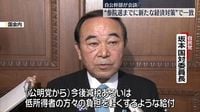On May 7, 2025, the executives of Japan's ruling Liberal Democratic Party (LDP) and the Komeito Party convened in Tokyo, reaching a consensus on the urgent need for new economic measures ahead of the upcoming House of Councillors election this summer. This meeting, which included key figures such as LDP Secretary-General Yutaka Moriyama and Komeito Secretary-General Makoto Nishida, focused on addressing rising prices and the implications of "Trump tariffs" on domestic industries.
The discussions underscored a growing concern about the economic burden on households, particularly with food prices continuing to rise. Nishida emphasized the substantial impact of food costs, stating that the party believes tax cuts and benefits should be part of the economic strategy. He remarked, "We need to consider necessary tax cuts and benefits to alleviate the financial strain on families."
Following the meeting, LDP's National Strategy Committee Chairman Tetsushi Sakamoto reiterated the importance of implementing measures that the public can accept before the election. He stressed, "We must devise economic policies that the people can agree with before the House of Councillors election." This sentiment reflects a recognition of the electorate's growing dissatisfaction with rising living costs, particularly amid the backdrop of the ongoing discussions surrounding tariffs imposed by the Trump administration.
The meeting also addressed the pressing issue of rice prices, which have remained high despite government efforts to release stockpiled rice into the market. Prime Minister Shigeru Ishiba instructed his party members to explore further measures to control food prices, particularly rice, which has seen a significant price surge. Ishiba noted, "Tariffs on automobile parts are a very big problem for Japan, so we need to take thorough measures." This statement highlights the broader economic challenges posed by international trade policies.
In the context of rising prices, the LDP has faced internal debates regarding the potential for consumption tax cuts. Recent surveys indicate that approximately 80% of party members support reducing the consumption tax rate, particularly in light of the opposition Constitutional Democratic Party's proposal for a zero tax rate on food products. However, Ishiba has expressed caution regarding tax cuts, emphasizing the need for careful consideration given the disproportionate impact of rising prices on low-income households. He stated, "We need to think carefully about how to help those who are suffering the most from price increases."
As the political landscape shifts with the upcoming election, both the LDP and Komeito are keenly aware of the need to present a united front on economic issues. The parties are expected to finalize their economic proposals in June, aiming to solidify their campaign platforms ahead of the election. Observers note that the economic measures discussed in these meetings could become central elements of the LDP's campaign strategy, particularly as voter sentiment shifts in response to rising living costs.
Moreover, the impact of U.S. tariffs on Japanese products continues to loom large. The U.S. recently imposed a 25% additional tariff on automobile parts imported from Japan, which has raised concerns among Japanese manufacturers about the potential adverse effects on their businesses. The ongoing negotiations between Japan and the U.S. regarding these tariffs will likely play a significant role in shaping Japan's economic policy moving forward. As one LDP official remarked, "The uncertainty surrounding these tariffs could have long-term implications for our economy."
In addition to economic measures, the ruling parties are also preparing to respond to legislative proposals from opposition parties, including the push for a selective surname system for married couples. This proposal has gained traction within the Constitutional Democratic Party, prompting the LDP and Komeito to coordinate their responses to ensure a unified approach.
As the summer election approaches, the pressure is mounting on the ruling parties to deliver effective economic policies that resonate with voters. With rising prices and the complexities of international trade relations at the forefront of public concern, the LDP and Komeito must navigate these challenges carefully to maintain public support and ensure electoral success.
The discussions held on May 7 represent a critical juncture for Japan's ruling coalition as they seek to address the pressing economic issues facing the nation. Whether they can effectively implement measures that alleviate the financial strain on households while managing the complexities of international trade remains to be seen. However, the consensus reached in this meeting indicates a commitment to prioritizing economic stability in the lead-up to the House of Councillors election.







